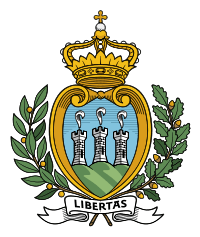Foreign relations of San Marino
 |
| This article is part of a series on the politics and government of San Marino |
San Marino is an independent and sovereign member of the international community. It maintains an extensive diplomatic network in relation to its diminutive size as well as an active foreign policy and international presence.
International organizations
Among other international organizations, San Marino is a full member of the following international organizations:
- United Nations
- International Court of Justice
- United Nations Educational, Scientific and Cultural Organization (UNESCO)
- International Monetary Fund (IMF)
- World Health Organization (WHO)
- World Tourism Organization (WTO)
- Council of Europe
- International Committee of the Red Cross
- International Criminal Court (ICC)
- International Institution for the Unification of Private Law (UNIDROIT)
It also cooperates with UNICEF and the United Nations High Commissioner for Refugees and has official relations with the European Union.
From May 10 until November 6, 1990, San Marino held the semi-annual presidency of the Committee of Ministers of the Council of Europe. The second San Marino Chairmanship of the Committee of Ministers of the Council of Europe was from November 2006 until May 2007.
Diplomatic relations
As of 12 June 2008 San Marino maintains official relations with 108 states. Austria, Bulgaria, France, Japan, Mexico, Monaco, Romania, Italy, the Sovereign Military Order of Malta, Croatia, and the Holy See maintain resident embassies or honorary consulates in San Marino. Other states maintain non-resident embassies and consulates, commonly based in Rome.
UN Secretary General visits and remarks

On 31 March-1 April 2013, United Nations Secretary-General Ban Ki-moon has been the official orator on the occasion of the newly elected Captains Regent. “Although this country is small, your importance to the United Nations stands as tall as Mount Titano,” the Secretary-General told the country's highest officials, the two Captains Regent, in reference to the country's 739 meter UNESCO World Heritage Site. Mr. Ban also noted that the country accepted five times as many refugees as its population during the Second World War, and praised its emphasis on protecting human rights.[1] This has been the second visit to San Marino by a UN Secretary General, the first being Boutrous Boutrous-Gali's visit in 1996.
See also
- List of diplomatic missions of San Marino
- List of diplomatic missions in San Marino
- San Marino-Serbia relations
References
External links
- San Marino Secretary of State website
- San Marino Chairmanship of the Committee of Ministers of the Council of Europe